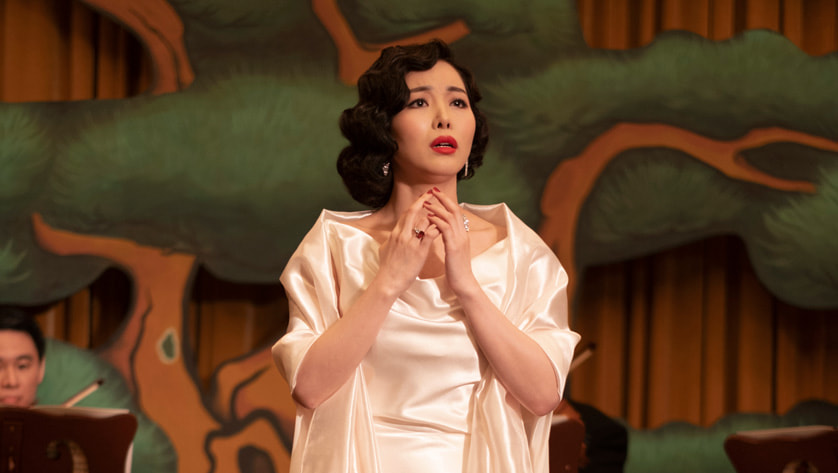In episode 4 of ‘Pachinko,’ an epic period drama encompassing multiple generations of a Korean Japanese family, the Korean landowner Han Geumja and her children come to sign the contract with Shiffley Bank in Tokyo in 1989, but things don’t go according to the plans. Sunja (Yu-na Jeon as the child, Minha Kim as the teen, and Youn Yuh-jung as the adult) sets out for South Korea With her son Mozasu (Soji Arai). In Busan in 1931, Teen Sunja marries Isak (Steve Sanghyun Noh) and sets out for Osaka and will not return to her homeland for over 50 years. Here is everything you need to know about the ending of ‘Pachinko’ episode 4. SPOILERS AHEAD.
Pachinko Episodes 4 Recap
The episode begins in a tailor’s shop with the first-ever meeting between Isak and Koh Hansu (Lee Min-Ho) in 1931. The latter evidently knows who the former is and constantly belittles him, commenting on his hand-me-down suit from his brother as well as his illness. Isak deals with the situation calmly, tells the tailor that he will need a new suit for his upcoming wedding, and asks him to rehem his brother’s suit so that his son can wear it someday. Apparently, Isak knows who Koh Hansu is as well. The son he is referring to here is not Mozasu. He hasn’t been conceived it. He is speaking about the child that Sunja is pregnant with. He has no way of knowing that it would be a boy, but this is the 1930s’ Korea. Even a generous and kind man like Isak has limitations to his progressiveness. In the book, Sunja ends up having a boy, and they name him Noa, who is likely to appear in the upcoming episodes. After their wedding, Sunja bids farewell to her mother, her friends, and her country and boards a passenger ship bound for Osaka.

In 1989, Han Geumja arrives with her children for the meeting. Right from the beginning, she seems quite reluctant to go forward with the deal. The reluctance grows as the meeting progresses and manifests as righteous anger toward decades of discrimination, ill-treatment, and racism. Meanwhile, Sunja arrives in Korea amidst heavy rain. She reaches the shores of her childhood and starts crying.
Pachinko Episodes 4 Ending: Does Han Geumja Sign the Contract with Shiffley Bank?
No, Han Geumja doesn’t sign the contract with Shiffley Bank. Her children clearly wanted her to do it. One billion Japanese Yen is an impressive amount of money. Although they must have grown up experiencing the same discrimination and ill-treatment as their mother, it likely became much more subtle, so they probably learned to ignore it. But Han Geumja didn’t place that kind of proverbial blindfold on her eyes, so she continues to experience it all. She speaks in Korean in a room filled with Japanese people. Han Geumja is talking to none of them but only to Solomon and her children. She reminds them of what their ancestors have faced since coming to Japan in harrowing detail. Han Geumja’s father came first, probably on a similar ship as Sunja, and later brought the rest of the family. Together, they struggled in a largely antagonistic country and persevered.

This is Han Geumja’s moment of resistance. Her words find their way into Solomon’s heart, especially after she brings up his grandmother, and he tells her not to sign. And that’s what she does and leaves. Afterward, feeling free as Han Geumja’s moment of resistance has become his as well, Solomon runs out into the street, comes across a group of street performers, and starts dancing uninhibitedly in the rain to their tune, just as his grandmother sheds her tears onto the sea.
Is the Korean Soprano Dead?
Sunja meets a Korean soprano, who seems quite popular among the Japanese, right before boarding the ship. The soprano accidentally drops her scarf, and Sunja returns it to her. The two women talk in Sunja’s mother’s presence, and the singer seems to realize Sunja’s circumstances and why she is traveling across the sea when she is due in two months. The singer tells Sunja that she will sing for their people. That evening, while Sunja is violently seasick, the singer stops midway into her performance and suddenly starts singing a Korean song. Her people, who are below deck, hear her song and respond with cheers, claps, and thumps against the ship’s walls and floor. The narrative shifts back and forth between the ship and the meeting room. Just as Solomon tells Han Geumja not to sign the papers, the singer draws out a knife and kills herself, making it her moment of resistance.

Historically, Korean soprano Yun Sim-deok took her life while traveling on a passenger ship. But that happened in 1926 and under different circumstances. She and her lover, playwright Kim U-jin, leaped off the ship while traveling to Busan from Simonoseki, Japan, and subsequently perished.
Read More: What is the Meaning of Pachinko Title? What is its Significance?


You must be logged in to post a comment.